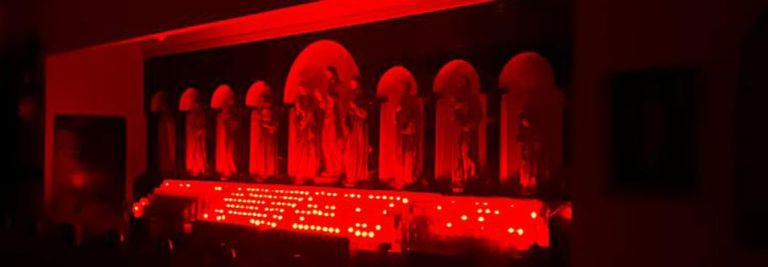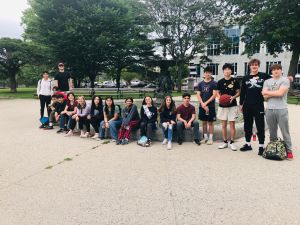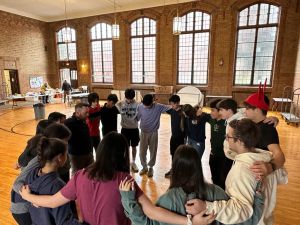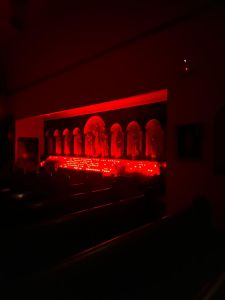Flowers in Hell
Elliot Guerra
It was in the winter that we decided on Maine. It was in the spring that we finalized our plans, and it was about three weeks before the trip when our housing, busing and financing all fell through. As close to 48 hours away from embarking on our annual teen service trip, our incredible staff and I were scrambling to make this trip happen. I can honestly say that with the exception of one other event, it was the most stressful week of my 16-year tenure at OLMC. Though because of the financial generosity of a parishioner, our committed staff and four adult chaperones who suddenly, and without hesitation, said “yes” to giving up a week for our teens, we embarked.
Professionally embarrassed, emotionally exhausted, and spiritually depleted I frankly did not want to attend the trip. I felt too tired, too old, and too worn out to lead anyone. I boarded the bus after a restless night only encouraged by my wife and the scripture pushing me forward: “Then I heard the voice of the Lord saying, ‘Whom shall I send? Who will go for us?’ ‘Here I am,’ I said; ‘send me!’” (Isaiah 6:8). I echoed St. Archbishop Romero’s prayer as the bus revved up, “I can’t. I must. I’m yours.”
We arrived in the New England town of Portland, Maine and met our generous hosts, one long-serving couple who left their 52nd wedding anniversary party to greet us, shop for us and make us breakfast! Usually I would be excited and thrilled, but this time around the feeling was frankly shame. I didn’t feel worthy of such love and service. People are often generous in complimenting me, but I often have to remind people that I am not some angel that fell from heaven and decided to go to Maine to serve others. I am paid by you for my work and I felt professionally unworthy of such generosity. Nevertheless, we attended 7 a.m. daily Mass at St. Peter’s the following day, an Italian parish hosting us, and it was not lost on me that we began and ended each day at St. Peter’s, named for a saint whose public failures and spiritual triumphs comforted me, and I began to think that something big was in store for us, good or bad, I felt that this trip was going to be different. It was, not to seem so grand, but what I witnessed was miraculous. I witnessed flowers blooming in hell.
Of course, Portland is not hell. Maine’s natural beauty, wonderful residents, and the city’s New England charm is salient, but poverty so engrained into our national fabric is indeed hellish. What I witnessed blossoming—your teens serving—was as beautiful, shocking, and bizarre as seeing flowers bloom in hell. I wasn’t surprised by our teens, they are committed, thoughtful, and work with purpose. Rather, I was surprised by the intensity of the work.
While we were there we served close to 200 people each morning, many unhoused and newly arrived refugees (who, due to our broken immigration system, are unable to work legally), many with children and often without shoes. Perhaps it is where I am in my life—a new father—but it simply broke my heart. I haven’t been moved to tears serving in a very long time. And there were your teens serving with incredible dignity, humor, compassion and a ferocious work ethic, which is to say nothing of the physical labor in the afternoons.
Bernard Lonergan, the erudite Jesuit theologian and philosopher, writes about conversion in his tome Insight. He writes that authentic human understanding—conversion—must go through three phases: moral, intellectual and finally, spiritual.
Authentic conversion is what was happening in Maine.
Every night our teens would gather for reflection and prayer and what we were going through was exactly how Lonergan formulated it. First, we were shocked and broken-hearted with the scandal that poverty showed us. In the world’s wealthiest nation, seeing American citizens and those seeking citizenship with nothing, morally shamed and frankly, outraged us. Then what followed were the teens’ questions—where this teacher becomes a student. They asked the fundamental intellectual question: why? Why are things this way? The question of “why”, so seemingly simple as it is complex, leads to complicated discussions and the understanding that there are many causes and many complex solutions that require a variety of approaches. Then, around the third day, the final step, a spiritual conversion cracks through the surface. The teens deeply understood the pain of the cross and the power of redemptive suffering. We all felt resurrection!
The poet Rainer Maria Rilke may have put it best. In the face of such authentic questioning, the only proper response to such love in the face of economic violence is so simple to be merely impossible: “You must change your life.” Our youth cannot un-see what they saw, they cannot undo what they’ve done. They must change their lives.
I know I did.
St. Augustine teaches us, “the opposite of love is not hate, but fear.” St. Pope John Paul II urges us to “be not afraid” and your young parishioners were fearless. They will bring that fearlessness into their parish, their schools, and their families—they have changed their lives.
I’m thrilled to be celebrating 150 years of faith, service, and community. Our celebrations are going to be so much fun, our Masses in a newly renovated worship space will be thrilling, but it is all for naught if our celebrations end there. If we are to celebrate authentically let us all recommit to service and to more than ever, better than ever love Christ.
Thank you OLMC for sending me, thank you teens for leading me.
I’ll be seeing you,
Elliot
Cover photo: St. Peter’s Parish where we ended each night in prayer.






